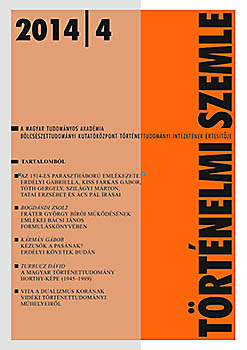„Hamis barátok rebelliója”. Szűcs Jenő Dózsa-tanulmányai – 40 év után
Falsorum Fratrum Rebellio Jenő Szűcs’s Essays on the Peasant Revolt of György Dózsa, after 40 Years
Author(s): Pál ÁcsSubject(s): Christian Theology and Religion, History, Military history, Political history, Recent History (1900 till today), 18th Century, Other Christian Denominations, Peace and Conflict Studies
Published by: Magyar Tudományos Akadémia Bölcsészettudományi Kutatóközpont Történettudományi Intézet
Keywords: Jenő Szűcs; Hungary; history; Peasant Revolt; György Dózsa;
Summary/Abstract: Jenő Szűcs (1928−1988) was a historian of great influence in the 1970s and 1980s, one of the renewers of Hungarian historical studies but has since been partially forgotten. In the 1970s, he wrote several important works on the „ideology” of Dózsa’s peasant war, that is, on the religious-intellectual background of the revolt. In striking opposition to the Marxist political understanding of the era, he did not pinpoint the real motives of the Dózsa revolt in economic and social tensions but in the peculiar spiritualism of Franciscan intellectuals. He saw the concepts of the Franciscan opposition as a kind of „pre-Reformation”. It was in connection to the Dózsa revolt that Jenő Szűcs elaborated his famous and much disputed thesis on the roots of Hungarian Protestant movements in the Franciscan opposition. The present essay seeks to weigh Szűcs’s four-decade old theses: it studies them in the light of the latest international trends in the research of Reformation and Millenarism.
Journal: Történelmi Szemle
- Issue Year: 2014
- Issue No: 04
- Page Range: 611-620
- Page Count: 10
- Language: Hungarian

